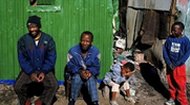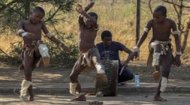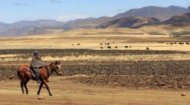|
South Africa Profile |
South Africa Profile |
South Africa Profile | South Africa Profile |
About daily life for a child in South Africa in information, facts and video with details of support projects.
More >
Details of how to sponsor a child and make a difference with child sponsor programs in South Africa.
More >

South Africa boasts the most industrialised and diverse economic profile in Africa, a legacy of its rich mineral resources and sophisticated financial sector. Historically, its economic power has been built upon vast reserves of gold, diamonds, platinum, and coal, making mining a foundational industry. Beyond minerals, the economy is diversified, with strong sectors in agriculture (wine, fruit, grains), manufacturing, automotive production, and a highly developed financial services industry that rivals many developed nations. Tourism also plays a crucial role, capitalising on the country's natural beauty and wildlife. Despite its inherent strengths, South Africa grapples with significant economic challenges. High unemployment, particularly among the youth, remains a persistent issue. Deep-seated income inequality, one of the highest in the world, sees a stark divergence between the wealthy elite and the struggling majority. Poverty, exacerbated by the global economic downturns and the COVID-19 pandemic, is a reality for millions. Other pressing problems include land reform, aimed at redressing historical injustices but facing implementation challenges, and a persistent energy crisis leading to frequent power outages (load shedding), which severely hampers industrial production and daily life. The government is focused on attracting foreign investment, stimulating small and medium-sized enterprises, and implementing policies to foster inclusive growth and reduce the wealth gap, striving for an economy that benefits all its citizens. Daily life in South Africa is a vibrant mosaic, but it's also profoundly influenced by the nation's ongoing challenges. For many, particularly in urban centres, daily life involves navigating modern infrastructure, bustling shopping malls, and a vibrant cultural scene. However, for a significant portion of the population, especially in rural areas and townships, daily life is a struggle against poverty, limited access to resources, and the lingering effects of historical disadvantage. The contrast between these two realities is one of South Africa's most striking features. One of the most pressing challenges is crime, which remains a significant concern, impacting security and the quality of daily life for many. The government and civil society are actively engaged in initiatives to address this complex issue, which is often linked to economic inequality and lack of opportunity. Furthermore, issues such as corruption, political instability, and service delivery failures frequently dominate public discourse. Access to clean water, reliable electricity, and quality healthcare and education continue to be critical challenges that the government is working to overcome, aiming to build a more equitable society. Environmental challenges such as water scarcity, especially in the Western Cape, and the broader impact of climate change, also pose long-term threats to the nation's sustainability and daily life. Despite its challenges, South Africa remains one of the world's most compelling destinations for its sheer beauty and diverse offerings. Its tourist attractions are legendary, drawing millions of visitors annually. For nature lovers, Kruger National Park stands as a jewel in the crown, offering unparalleled wildlife viewing opportunities, including the "Big Five" (lion, leopard, elephant, rhino, and buffalo). The dramatically sculpted Drakensberg Mountains, a UNESCO World Heritage Site, offer breathtaking hikes and ancient San rock art. The Blyde River Canyon, one of the largest canyons in the world, presents spectacular vistas. Culturally and historically significant tourist attractions abound. Robben Island, where Nelson Mandela was imprisoned, is a poignant reminder of South Africa's struggle for freedom. In Johannesburg, the Apartheid Museum and Constitution Hill provide powerful insights into the country's painful past and its journey to democracy. Cape Town, with its iconic Table Mountain, pristine beaches, and vibrant city life, is a perennial favourite, serving as a gateway to the Winelands, known for world-class vineyards. The scenic Garden Route on the country's southern coast offers a captivating journey through lush forests, charming towns, and stunning coastal landscapes. The Wild Coast in the Eastern Cape provides rugged beauty and a glimpse into traditional Xhosa culture. From shark cage diving to safaris, whale watching to exploring vibrant townships, South Africa offers an incredible array of experiences that cater to every interest, making it an unforgettable destination for any traveller.
Today, South Africa with its population of 64.7 million (2025), has an HDI ranking of 106 out of 193 countries and territories in 2025 when ranked in terms of life expectancy, literacy, access to knowledge and the living standards of a country, placing it in the top 6 most developed countries in Africa. For more about South Africa, read our profile pages above. |




















